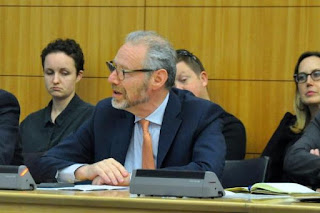WDC presents revised SoW at OECD
SoW,
an essential building block
In
the diamond supply chain!
Senior
officials of the World Diamond Council (WDC) have provided an overview of the
organization's revised System of Warranties (SoW), during two sessions on April
24 at the 13th Forum on Responsible Mineral Supply Chains of the Organization
for Economic Cooperation and Development (OECD) in Paris. During the briefings,
WDC President Stephane Fischler described the revised SoW as an "essential
building block" for participants in the diamond supply chain towards
implementing the OECD's due diligence guidance for minerals from high-risk
areas.
 WDC
President, Stephane Fischler addressing the deep-dive session at the OECD
Responsible Mineral Supply Chain forum on April 24, 2019. The first of the
sessions was an early-morning side event organized together with the
Responsible Jewellery Council (RJC), at which the WDC presented its revised SoW
and RJC explained its new Code of Practices.
WDC
President, Stephane Fischler addressing the deep-dive session at the OECD
Responsible Mineral Supply Chain forum on April 24, 2019. The first of the
sessions was an early-morning side event organized together with the
Responsible Jewellery Council (RJC), at which the WDC presented its revised SoW
and RJC explained its new Code of Practices.
The
second was a deep-dive session that was part of the OECD forum's main agenda.
Titled "Putting Commitments into Action," it focused on recent
standard-making developments in upstream and downstream diamond supply chains. The
deep-dive session was moderated by Terah de Jong, a technical advisor at the
USAID Artisanal Mining and Property Rights Project.
WDC
Board Member Peter Karakchiev, who chaired the side event at the OECD forum on
April 24, 2019.
The
WDC's revised SoW was approved by the organization's Board of Directors in
October 2018. Like the earlier version of the SoW, it requires all participants
in the diamond and jewelry value chain, from mining companies to jewelry
retailers, to issue warranty statements on their B2B invoices and memos,
testifying that the diamonds being sold originated from sources in compliance
with the Kimberley Process Certification Scheme (KPCS).
 But
the statement now also verifies that the participants adhere to the revised
SoW, which requires that they conduct a self-assessment to ascertain whether
they comply with universally accepted principles on human and labor rights,
anti-money laundering (AML) and anti-corruption.
But
the statement now also verifies that the participants adhere to the revised
SoW, which requires that they conduct a self-assessment to ascertain whether
they comply with universally accepted principles on human and labor rights,
anti-money laundering (AML) and anti-corruption.
The
revised SoW Guidelines specifically reference the UN Guiding Principles on
Business and Human Rights, the ILO Declaration on Fundamental Principles and
Rights at Work, the UN Convention Against Corruption, and also national AML
guidelines that comply with the FAFT 40 Recommendations on Money Laundering for
Dealers in Precious Metals and Stones.
Marie-Chantal
Kaninda, WDC Executive Director, during the side event at the OECD forum on
April 24, 2019.
"The
revised SoW has to be seen within the context of a range of responsible supply
chain opportunities being offered to a very diverse industry," said Mr.
Fischler. "The ultimate objective for all of us is the same - ensuring
consumer confidence in the products we sell. The different systems need to be
complementary, being building blocks on the road to full compliance."
"The
revised SoW is designed to support the KPCS, covering not only the trade in
rough diamonds, but polished diamonds as well, and also trading between every
participant in the diamond and jewelry value chain, and not only trade between
participants in different countries," explained Peter Karakchiev, the
CIBJO Board member who chaired the side event on April 24. "We are hoping
that the KPCS will be expanded to include provisions related to human rights,
labor rights, anti-corruption and AML, but we are not waiting for it to happen,
and have already incorporated those elements in our own system."
WDC
Board Member Feriel Zerouki, speaking during the side event at the OECD forum
on April 24, 2019.
 Mr.
Fischler and Mr. Karakchiev both explained that diamond companies are not
permitted to pick and choose what elements to implement. "Members of the
trade who implement the SoW are required to fulfill all of its elements
depending on their size and sector, as they are outlined in the
Guidelines," Mr. Karakchiev said. "The self-assessment toolkit that
is being developed will help them do that."
Mr.
Fischler and Mr. Karakchiev both explained that diamond companies are not
permitted to pick and choose what elements to implement. "Members of the
trade who implement the SoW are required to fulfill all of its elements
depending on their size and sector, as they are outlined in the
Guidelines," Mr. Karakchiev said. "The self-assessment toolkit that
is being developed will help them do that."
It
should be noted that implementation of the SoW is already required by a range
of industry bodies, including RJC, the World Federation of Diamond Bourses
(WFDB), De Beers' Best Practice Principles and CIBJO's new Responsible Sourcing
Blue Book.





Comments
Post a Comment